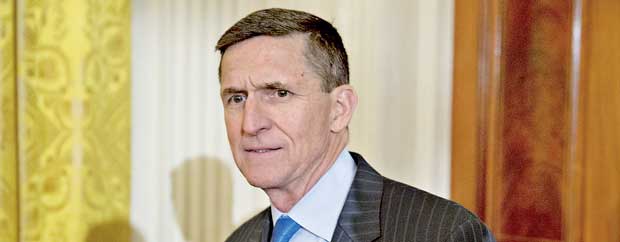15 Feb 2017 - {{hitsCtrl.values.hits}}

By Greg Miller and Philip Rucker The Washington Post
Michael T. Flynn, the national security adviser to President Trump, resigned late Monday over revelations about his potentially illegal contacts with the Russian ambassador to the United States, and his misleading statements about the matter to senior Trump administration officials.
Flynn stepped down amid mounting pressure on the Trump administration to account for its false statements about Flynn’s conduct after The Washington Post reported Monday that the Justice Department had warned the White House last month that Flynn had so mischaracterized his communications with the Russian diplomat that he might be vulnerable to blackmail by Moscow. In a letter to Trump, Flynn said he had “inadvertently briefed the Vice President Elect and others with incomplete information regarding my phone calls with the Russian ambassador. I have sincerely apologized to the president and the vice president.”
Flynn was referring to his disproven claims to Vice President Pence and others a month ago that he had never discussed U.S. sanctions against Moscow with Russian Ambassaodor Sergey Kislyak. Pence, White House spokesman Sean Spicer and others, relying on Flynn’s accounts, publicly defended him and repeatedly declared in categorial terms that sanctions were never discussed.
President Trump accepted Flynn’s resignation letter and appointed Keith Kellogg, a decorated retired Army lieutenant general, as acting national security adviser.
Flynn’s resignation — after just 24 days on the job — caps a decorated career in public service for the retired lieutenant general and intelligence official. Kellogg is one of three candidates Trump is considering as a permanent replacement for Flynn, according to a senior White House official. The other two are David H. Petraeus, a former CIA director and retired general, and Vice Adm. Robert Harward, a former deputy commander of the U.S. Central Command.
One senior White House official said that Trump did not fire Flynn; rather, Flynn made the decision to resign on his own late Monday evening because of what this official said was “the cumulative effect” of damaging news coverage about his conversations with the Russian envoy.
Flynn was forced out less than a week after it was disclosed that he had discussed U.S. sanctions against Russia with that country’s ambassador before Trump was sworn in as president.
But Flynn’s undoing was more directly tied to his inaccurate accounts of those contacts to senior Trump officials including Pence, who officials said was incensed to learn that Flynn has not told him the truth.
Flynn again denied that he had discussed the subject in an interview with The Washington Post last week, only to back away from that statement a day later by acknowledging, through a spokesman, that while he couldn’t recall speaking about sanctions he could not rule it out.
In fact, U.S. intelligence and law enforcement officials have said that sanctions was a main subject of Flynn’s conversation with Kislyak on the day that the Obama administration announced a series of punitive measures aimed at punishing Moscow for its meddling in the 2016 U.S. presidential election.
Flynn’s departure just weeks into the Trump administration compounds the confusion in the National Security Council that is supposed to serve as a disciplined coordination centre for the administration’s handling of international affairs.
Instead, the White House faces an escalating court fight over an immigration ban aimed at Muslim-majority countries, has alienated key allies with Trump’s brusque phone calls to foreign leaders, and seemed so caught off-guard by North Korea’s recent ballistic missile test that Trump and senior officials were shown learning of the development on cell phones in full view of patrons at Trump’s Mar-a Lago resort.
U.S. officials said that Flynn told Kislyak that Moscow should not overreact to the sanctions, indicating that the two sides would soon be in position to revisit the matter, presumably in Moscow’s favor.
In conveying that message, Flynn may have broken a law against unauthorized individuals negotiating with foreign governments over conflicts. He is unlikely to face legal sanction, however, because that law dates to 1799 and has never been prosecuted.
But Flynn’s departure is unlikely to end the trouble the issue has created for the Trump administration. The Post reported Monday that then-acting U.S. Attorney General Sally Q. Yates told the White House counsel last month that Flynn’s misleading statements to Pence and others made him vulnerable to blackmail by Russia, whose own government would have known that sanctions were discussed.
The White House appears to have let its repeated false statements about Flynn stand for weeks after that notification from Yates, and has yet to account for what it did with the warning she conveyed. The disclosures about Flynn have added to the swirling suspicion about the Trump administration’s relationship with Moscow — suspicion based in part on Trump’s repeated expressions of admiration for Russian President Vladimir Putin.
17 Nov 2024 28 minute ago
17 Nov 2024 49 minute ago
17 Nov 2024 1 hours ago
17 Nov 2024 3 hours ago
17 Nov 2024 3 hours ago